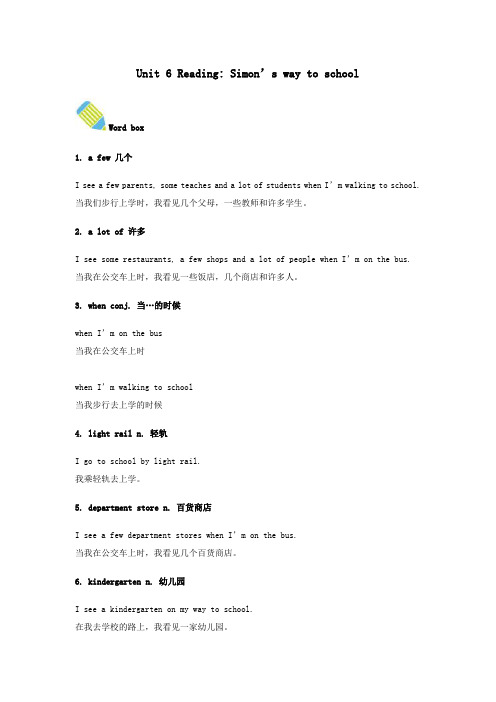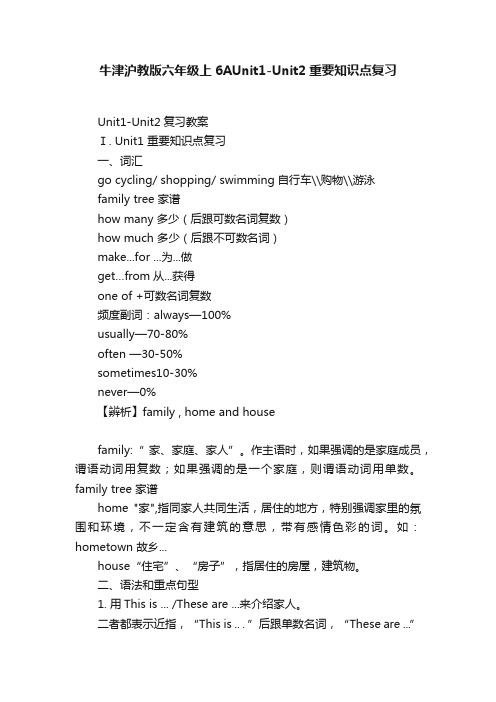六年级英语语法第六单元词汇语法解析素材(2)牛津版
- 格式:doc
- 大小:42.00 KB
- 文档页数:3

Unit 6 Keep our city clean一、单词1.k ee p[k iːp]保持2.city[ˈsɪtɪ]城市3.d ir ty[ˈdɜːtɪ]肮脏的4.sm o ke[sməʊk]烟雾5.air[eə(r)]空气6.r u bbish[ˈrʌbɪʃ]垃圾7.mess y[ˈmesɪ]凌乱的8.riv er[ˈrɪvə(r)]河9.D ea d[d e d]死去的10. m o ve[ˈm uːvɪ]移动11.bin[bɪn]垃圾桶12.pl a nt[plɑːnt]种植13.id ea[aɪˈdɪə]主意14.cl a ss[klɑːs]同学们15.th r ow[θrəʊ]扔16.bea u tiful[ˈb juːtɪfl]美丽的17.skin[skɪn]果皮18. gr ou nd[ɡr aʊnd]地面19. sl i p[slɪp]滑倒20.f all[fɔːl]摔倒21.h o s p ital[ˈhɒs pɪtl]医院22. m ore[mɔː(r)]更多的23.f a ctor y[ˈfæktrɪ]工厂24. cl ea n[kl iːn]干净的二、词组1. 保持我们的城市干净keep our city clean2. 这些我们城市的图片these pictures of our city3. 使我们的城市变脏make our city dirty4. 汽车尾气smoke from cars5. 使空气变脏make the air dirty6. 来自工厂的黑烟black smoke from factories7. 使街道又脏又乱make the streets messy and dirty8. 水里的垃圾rubbish in the water9. 死鱼the dead fish 10. 乘公交(地铁)上学take the bus(metro) to school11. 走路上学walk to school(go to school on foot)12. 把垃圾放进垃圾桶put rubbish in the bin13. 把一些工厂搬离我们城市move some factories away from our city14. 种更多的树plant more trees15. 帮助保持空气干净help keep the air clean 16. 你们的主意your ideas17. 干得好well done18. 就这个话题做一个演讲give a speech on this topic19. 保持我们学校干净keep our school clean 20. 扫地sweep the floor21. 擦桌椅clean the desks and chairs22.把垃圾扔地上throw rubbish on the floor(ground)把地上的垃圾捡起来pick up rubbish on the floor(ground)23. 两只小黑鹂two little blackbirds 24. 一个叫...... one named...25. 放学后走路回家walk home after school26. 喜欢住在城市里like living in the city27. 许多博物馆many museums 28. 又干净又美丽clean and beautiful29. 扔一个香蕉皮在地上throw a banana skin on the ground30. 捡起...... pick...up31. 滑倒在那块香蕉皮上slip on the banana skin 32. 去看病go to hospital 33. 为了保持公园干净to keep the park clean 34. 那样做do that 35. 太迟了too late三、句子1. What makes the air dirty? 什么使空气变脏?Smoke makes the air dirty. 烟雾使空气变脏。

Unit 6 Reading: Simon’s way to schoolWord box1. a few 几个I see a few parents, some teaches and a lot of students when I’m walking to school.当我们步行上学时,我看见几个父母,一些教师和许多学生。
2. a lot of 许多I see some restaurants, a few shops and a lot of people when I’m on t he bus. 当我在公交车上时,我看见一些饭店,几个商店和许多人。
3. when conj. 当…的时候when I’m on the bus当我在公交车上时when I’m walking to school当我步行去上学的时候4. light rail n. 轻轨I go to school by light rail.我乘轻轨去上学。
5. department store n. 百货商店I see a few department stores when I’m on the bus.当我在公交车上时,我看见几个百货商店。
6. kindergarten n. 幼儿园I see a kindergarten on my way to school.在我去学校的路上,我看见一家幼儿园。
7. housing estate n 居民区I see a lot of housing estate on my way to school.在我上学的路上,我看见许多住宅小区。
8. temple n. 庙宇I see some temples on my way to school.在我上学的路上,我看见一些庙宇。
Language focus:1. a lot of后接可数名词和不可数名词many后接可数名词much后接不可数名词some后接可数名词和不可数名词few后接可数名词little后接不可数名词2. a restauranta hotelan advertisement board3. when I’m on the bus4. when I’m walking to school5. by bus / school bus / taxi / underground / light rail / ferry6. on one’s way to school-on my way to school on one’s way home-on my way home。

牛津沪教版六年级上6AUnit1-Unit2重要知识点复习Unit1-Unit2复习教案Ⅰ. Unit1 重要知识点复习一、词汇go cycling/ shopping/ swimming自行车\\购物\\游泳family tree 家谱how many 多少(后跟可数名词复数)how much 多少(后跟不可数名词)make...for ...为...做get…from从...获得one of +可数名词复数频度副词:always—100%usually—70-80%often —30-50%sometimes10-30%never—0%【辨析】family , home and housefamily:“ 家、家庭、家人”。
作主语时,如果强调的是家庭成员,谓语动词用复数;如果强调的是一个家庭,则谓语动词用单数。
family tree 家谱home "家",指同家人共同生活,居住的地方,特别强调家里的氛围和环境,不一定含有建筑的意思,带有感情色彩的词。
如:hometown 故乡...house“住宅”、“房子”,指居住的房屋,建筑物。
二、语法和重点句型1. 用This is ... /These are ...来介绍家人。
二者都表示近指,“This is .. . ”后跟单数名词,“These are ...”后跟复数名词或者多个不同的对象。
2.用how many 来询问数量后接可数名词的复数形式,当我们提问你有多少……时候,如果How many后跟人,常用how many... do you have?如果How many 后跟物,常用how many...have you got?3.What do you do with your... ? 和What else do you do with your... ? 来提问与家庭成员或亲戚一起做什么.else 意为别的其他的,常用于特殊疑问词或不定式之后,如what else, something else等。


Unit 6 Planning for the weekend一、单词plan计划(现在分词planning);play(戏剧的)演出;玩take part ( in )参加;参与join、join in和take part in 有什么区别?1)join:及物动词,“加入(团体,组织,参军)、同……一起干或玩、连接”例句:①I joined the Party in 1975.(我1975年入党。
)②His brother joined the army two years ago. 两年前他哥哥参军。
③They are planning to join the two towns by a railway.(他们在计划用一条铁路把两个镇连接起来。
)2)join in: 参加(某些活动)例句:①May I join in your discussion?我可以参加你们的讨论吗?②Many people join in the game every year.(每年许多人参加这个游戏活动。
)3)take part in 参加(群众性活动,会议等)参加者持积极态度,起一份作用。
例句:A lot of students took part in the movement last year.(去年很多学生参加了那个运动。
)picnic野餐concert音乐会outing短途旅游project工程Beijing opera京剧Singing contest唱歌比赛二、词组:1. have school上课;有课The children do not have school today.2.have a picnic野餐3. I‟d love to 我很愿意…4.go on an outing去远足5. by the way顺便地;附带说说6.see a play看戏剧演出7. see a Beijing opera show看京剧演出8.of course当然9. warm and sunny温暖晴朗10.give a concert举行音乐会11. take part in the sports meeting参加运动会12. call sb. 打电给…13.join us参加我们14. talk about their plans for the weekend谈论他们的周末计划15. still in bed还在床上st year去年17.meet at one thirty in front of the Garden Theatre 一点半在花园剧院门前会面e with sb. 和Sb.一起来19.at the concert在音乐会上20.meet at the bus stop at 10:30 10:30在公交车站会面21.a new zebra from Africa 来自非洲的新斑马22. go out an outing外出旅行三、句型:1. 一般将来时be going to (表示“打算、将要、准备去做某事”)询问“某人打算干什么”及其应答:----What are we/you going to do?----We‟re/I‟m going to+动词原形/地点+时间(例如:---What are you going to do at 10:15 tomorrow morning?----I‟m going to…)----What is he/she/Liu Tao going to do?----He/She is going to…----What are Liu Tao and Tom going to do?----They are going to…其它特殊疑问句:----Where are you going? ----I‟m going to Hongmei Park.----What time are you going to come home? ----At 4:30, I think.----When are they going to meet?----They‟re going to meet at 1:30.Will与be going to区别:I‟m going to visit the History Museum. / I will visit the History Museum. be going to与will两者都表示将要发生的事、将要去做某事有如下几点差别:1. be going to 表示近期、眼下就要发生的事情,will 表示的将来时间则较远一些,如:He is going to write a letter tonight. He will write a book one day.2. be going to表示根据主观判断将来绝对发生的事情,will表示客观上将来势必发生的事情。

U6一、必会词组1. travel v./ n. 行走,旅行【知识拓展】travel—traveled—traveled—traveling或者travel—travelled—travelled—travelling注意过去式、过去分词及现在分词,l可以双写,也可以不双写。
travel与tour都可以表示旅游,对应的游客分别为travel(l)er和tourist。
go travelling 去旅游2. ferry n. (1)渡船(2)渡口v.(用船或飞机等)运送(货物)(通常指短程的或定期的)【知识拓展】by ferry 乘船3. advertisement n. 广告【知识拓展】advertise v.为……做广告4. board n. 栏;板【知识拓展】abroad adv. 在国外,到国外。
broad adj. 宽广的。
形象记忆board这个单词:首尾bd两个字母想象成船头和船尾,中间oar是一个单词,意思是“桨”,所以board有“甲板,上船”的意思。
5. a few 几个。
a few只能修饰可数名词复数形式,与之对应的是a little, 只能修饰不可数名词。
练习:I.Read and complete the sentences.(根据给出的首字母,完成句子。
)1. I have been to Jing’an T .It's in the centre of Shanghai.2. My father’s office is far away from home. He goes to work by l r every morning because it is fast.3. Mum likes going to some department s at weekends.4. We live in a new h e . It's large and beautiful.keys: 1.Temple 2.1ight rail 3.stores 4.housing estate 【乘坐交通方式表达】乘坐交通工具的表达:by bus/by car/by underground/by bike/by plane/by ferry /on foot乘公共汽车/乘小汽车/乘地铁/骑自行车/乘飞机/乘轮渡/步行。
【牛津小学英语六年级】第六单元词汇语法分析(2)Unit 5 Reading Open DayWord box1. programme n.活动安排Miss Guo and her students are planning the programme for their Open Day.郭老师和他的学生正在计划开放日的活动。
2. entrance n.进口处I’ ll meet our parents at the entrance of our school.我将在学校进口处欢迎家长。
3. choir n.合唱队Then they’ ll listen to the school choir in the hall at three ten.而后一再点十分,他们将听学校合唱队的演唱。
4. noticeboard n.公告栏After that, they’ ll look at our English Club noticeboard in the library at four.那此后,四点时他们将在图书室看我们英语俱乐部的公告栏。
5. parent n.父亲母亲Your parents will arrive at two o'clock.你们的父亲母亲将在两点钟抵达。
6. arrivev.抵达Your parents will arrive at two o’ clock.你们的父亲母亲将在两点钟抵达。
7. first adv.第一First, they visited our classroom on the second floor at two fifteen.第一他们在两点十五分观光我们的教室。
8. classroom n.教室First, they visited our classroom on the second floor at two fifteen.第一他们在两点十五分观光我们的教室。
6A语法归纳Unit1在过去某个时间里发生的动作或存在的状态:过去习惯性或经常性的动作、行为。
ago, yesterday, the day before yesterday, last week (year, night, month…),in 1989,jus t now, long long ago, once upon a time.3.肯定句主语+行为动词〔过去式〕+其他。
4.例如:I was born in 1998. 我在1998年出生。
My grandfather died last year.我〔外〕祖父去年去世了。
5.否认句: 主语+didn’t+行为动词〔原形〕+其他。
例如:He didn’t do his homework yesterday. 他昨天没有做他的家庭作业。
I didn’t know you were here. 我不知道你在这儿。
Did+主语+行为动词〔原形〕+其他?肯定答复:Yes,主语+did. 否认答复:No,主语+didn’t.例如:---Did you go to the zoo last week? 你上周去动物园了吗? ---Yes, I did. 是的,我去了。
构成方法:1) 一般在动词词尾直接加-ed.help-helped, clean-cleaned, visit-visited, show-showed, walk-walked, look-looked, sho ut-shouted, point-pointed2) 以不发音的字母e结尾的动词,在词尾直接加-d. live-lived, move-moved, like-liked,3) 以辅音字母加y结尾的动词,变y为i,再加-ed. study-studied, cry-cried4) 以一个元音字母加一个辅音字母结尾的重读闭音节动词,先双写末尾的辅音字母,再加-ed. plan-planned, stop-stopped不规那么变化〔特殊记忆〕:am/is-was, are-were, go-went, meet-met, see-saw, do-did, get-got, read-readUnit21. 〔1〕表示天气的形容词 warm cool hot coolsunny windy cloudy rainy snowy〔2〕形容词的用法:〔3〕形容词可以修饰名词,一般放在名词的前面。
Unit 6 Reading
Word box
1. travel v. 行走; 旅行
Find out the amount of time your classmates spend traveling to school. 弄清楚你们班同学上学花费的时间。
Travelling time to school
去学校的行走时间
2. about adv. 大约
Simon goes to school by bus. It takes him about ten minutes.
西曼乘公交去上学,要花费他大约十分钟。
3. minute n. 分钟
Simon goes to school by bus.It takes him about ten minutes.
西曼乘公交去上学,要花费他大约十分钟。
4. ferry n. 渡轮
Jill goes to school by ferry.
吉尔乘渡轮上学。
5. hour n. 小时
Joe goes to school by underground. It takes him about half an hour.
乔乘地铁去上学,要花费他半个小时。
6. half an hour半小时
Joe goes to school by underground. It takes him about half an hour.
乔乘地铁去上学,要花费他半个小时。
7. hotel n. 旅馆
I see a hotel, some restaurants and a lot of people when I’m on the bus.
当我坐在公交车上时,我看见一家旅馆,一些饭店,许多人。
8. advertisement n. 广告
I see an advertisement board, some restaurants and a lot of people when I’m on the bus.
当我坐在公交车上时,我看见一个广告牌旅,一些饭店,许多人。
9. board n 板,栏
I see an advertisement board, some restaurants and a lot of people when I’m on the bus.
当我坐在公交车上时,我看见一个广告牌旅、一些饭店和很多人。
Language focus:
1. 三个花费:spend, cost, take
Sb spend time/money in doing sth
Sb spend time/money on sth
It / Sth takes sb time to do sth
It / Sth costs sb money to do sth
2. by bus / ferry / underground 坐公交车 / 轮渡 / 地铁
on foot 步行
3. transport交通方式
4. Mum, how long does it take you to get to the supermarket? It takes me about ten minutes to get there.
How long 多久,多长时间
It take sb time to do sth 花费某人时间去做某事
get to 到达
get there 到达那里
5. be near=live near
6. be far away from=live far away from
7. go to school by bus / ferry / underground
8. go to school on foot。